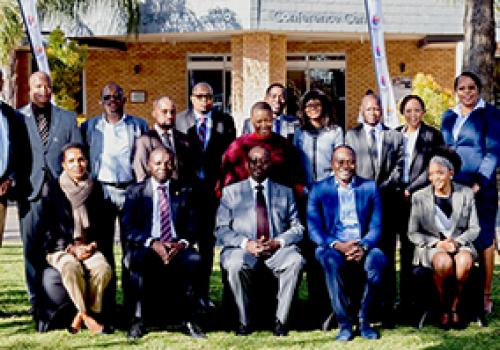“It is common course that, when most people think of Peace Support Operations (PSOs), they think of the military and at times police personnel. However, while it is true that security personnel play an important role in most peace operations, and that security is a necessary part of peace operations, it is equally important during peace support operations to also manage the political, social and economic aspects of a peace process.
The political and socio-economic aspects of the peace process are thus managed by the civilians, and therefore, over the years there has been a transformation from military to civilian-led multidimensional Peace Support Operations.” This was stated by the Chief of Staff of the SADC Standby Force Planning Element (SADC SF PLANELM), Brig. Michael Mukokomani while addressing a group of civilian experts in Botswana during a SADC SF Civilian Component awareness raising workshop held at the Cresta Lodge, Gaborone, Botswana from 11 to 12 July 2017.
This workshop was organized by the SADC Secretariat/ SADC SF PLANELM to raise awareness among civilian experts in the Republic of Botswana on the role of civilians in Peace Support Operations and to encourage participants to apply to become members of the SADC SF Civilian Roster. This is done in order to ensure the full operationalization of the Civilian Component and the availability of civilian experts to the SADC Standby Force capacity.
The SADC SF Civilian Roster is a component of an integrated Civilian Roster of the African Standby Force (ASF) known as the African Standby Capacity (ASC) which was developed by the Africa Union (AU) in collaboration with Regional Economic Communities (RECs) and Regional Mechanisms (RMs). The ASC is a recruitment tool to enable rapid deployment of civilian experts to Peace Support Operations once the missions are mandated, either by the SADC Summit or the African Union.
The Roster is being populated with civilian experts from different professions which are most relevant to a multi dimensional PSO, such as Civil Affairs, Political Affairs, Legal Affairs, Public Information, Human Rights, Gender, and Humanitarian relief liaison to name a few.
At the workshop, participants had an insight of the role of civilians in Peace Support Operations; and the opportunity to appreciate the benefits of joining the ASC/ SADC Standby Force Roster. Presentations and discussions at the workshops centered on issues pertaining to the Concept of a Standby Force with emphasis on the civilian capability; PSO structures at the Strategic, Mission and Operational Levels; Rostering Processes; and Rostering and Training Linkage. A demonstration on how to apply online for the ASC Roster membership was also conducted in order to deal with challenges which applicants normally face when they attempt to apply. Participants were accordingly inducted on how to access the African Standby Capacity website/database (https://database.africanstandbycapacity.org) and apply for membership of the civilian roster for both the SADC Standby Force and the African Standby Force.
The Workshop drew participants from different Government Ministries, Institutions and Non-State Actors such as the Ministry of International Affairs and Cooperation and the Botswana Council of Non- Governmental Organizations (BOCONGO). At the end of the workshop, more than fifteen (15) civilian experts expressed interest and committed themselves to apply for the Roster membership.
The SADC Standby Force was established through a Memorandum of Understanding (MOU) signed by the SADC Heads of States and Government in Lusaka, Zambia in 2007. The Force is a multi-dimensional entity comprising the military, police and civilian components. Its main function is to participate in Peace Support missions as envisaged in Article 13 of the Protocol Establishing the Peace and Security Council of the African Union (AU) under the Framework of the African Peace and Security Architecture (APSA) and African Standby Force.
In July 2016 the regional Standby Forces including the SADC SF were declared to have attained Full Operational Capability (FOC) status. Subsequent to this declaration, the SADC Secretariat has been taking concerted efforts to ensure that all components of the SADC SF namely the Military, Police and Civilian are ready for deployment when the need to deploy arises. This workshop is therefore among a series of workshops that the SADC Secretariat is intending to conduct in all SADC Member States in 2017 in order to strengthen and ensure readiness of the Civilian Component of the SADC SF. So far, the Secretariat has conducted similar workshops in the Republic of Malawi and the United Republic of Tanzania.

